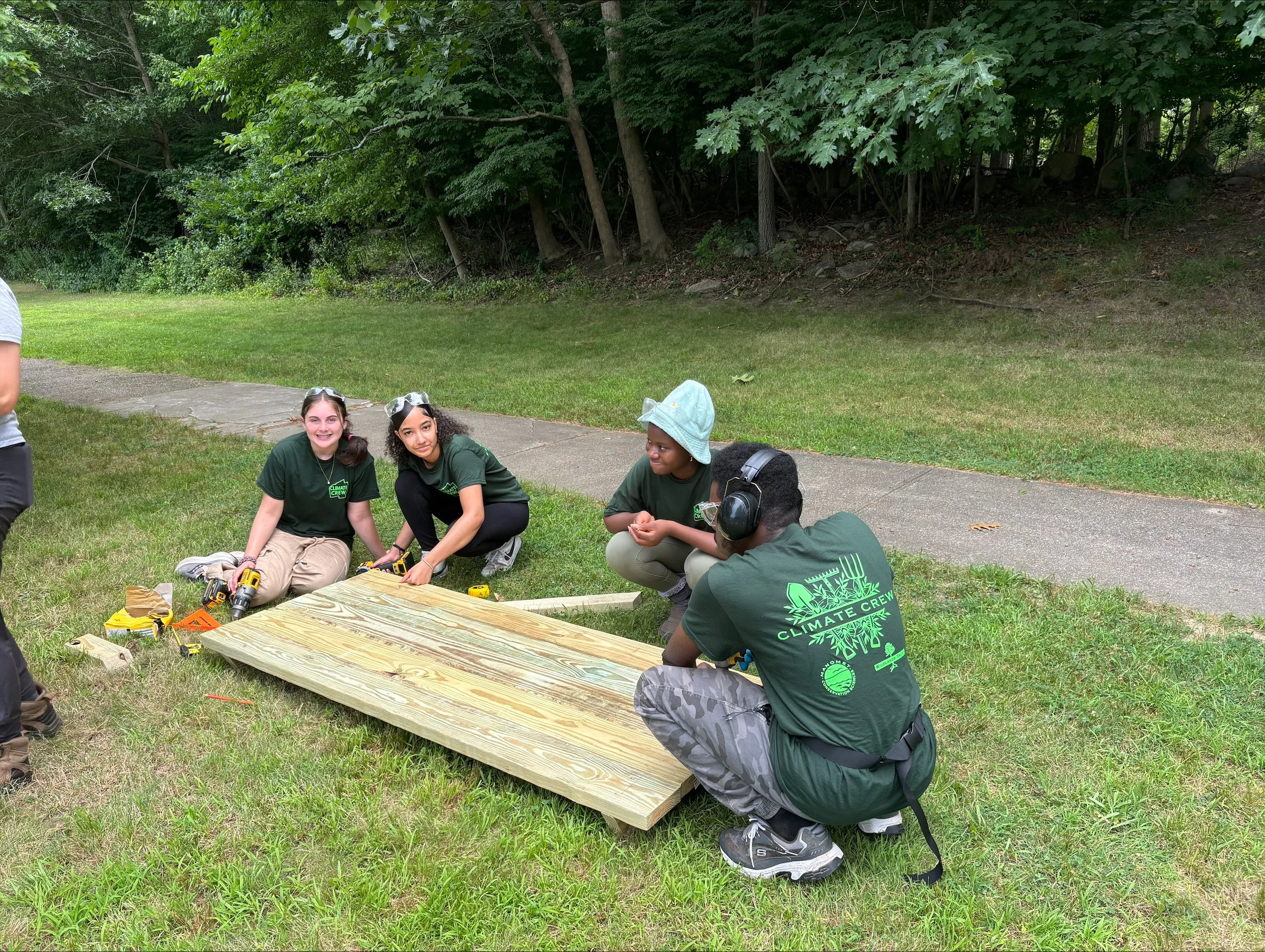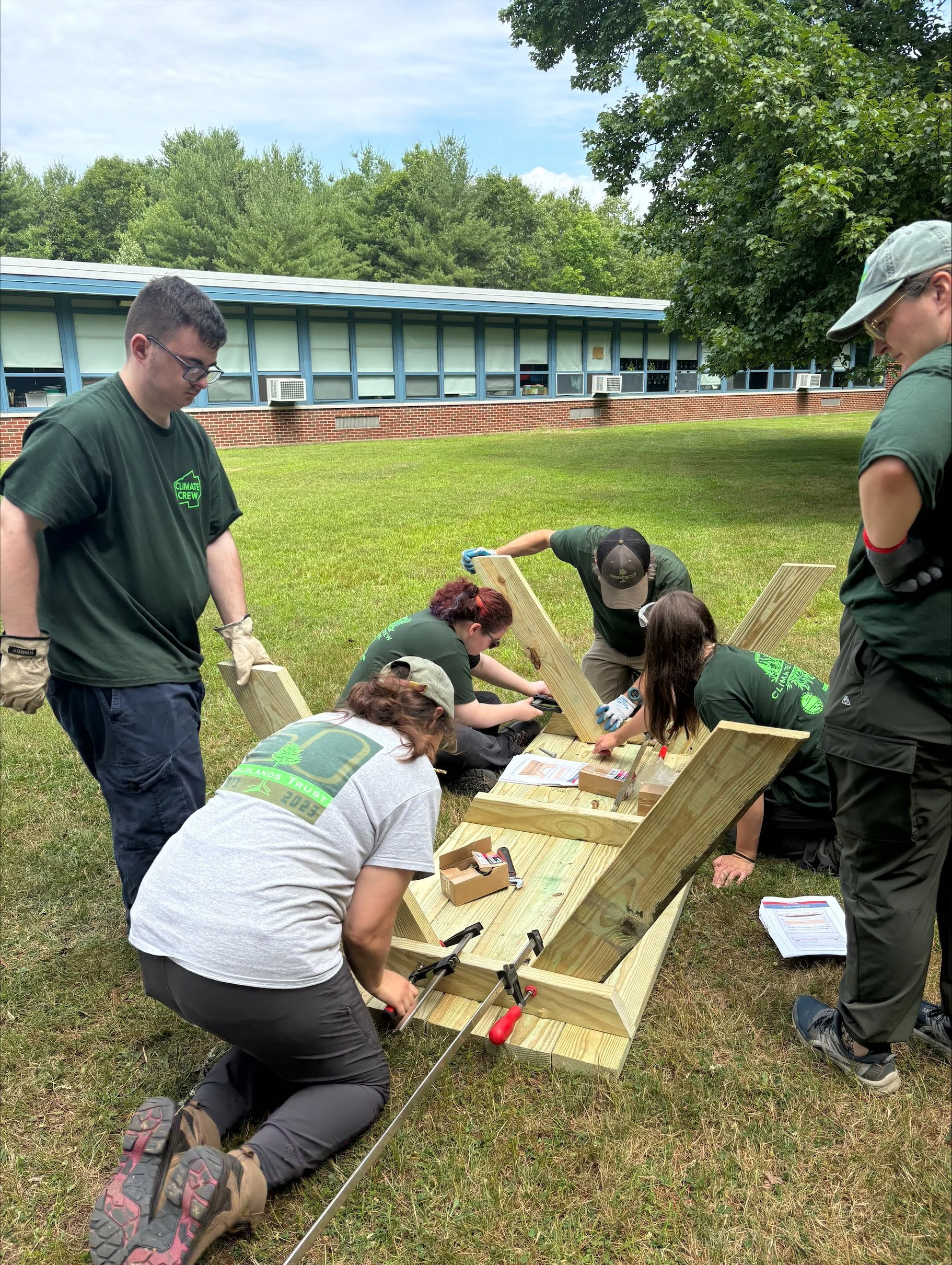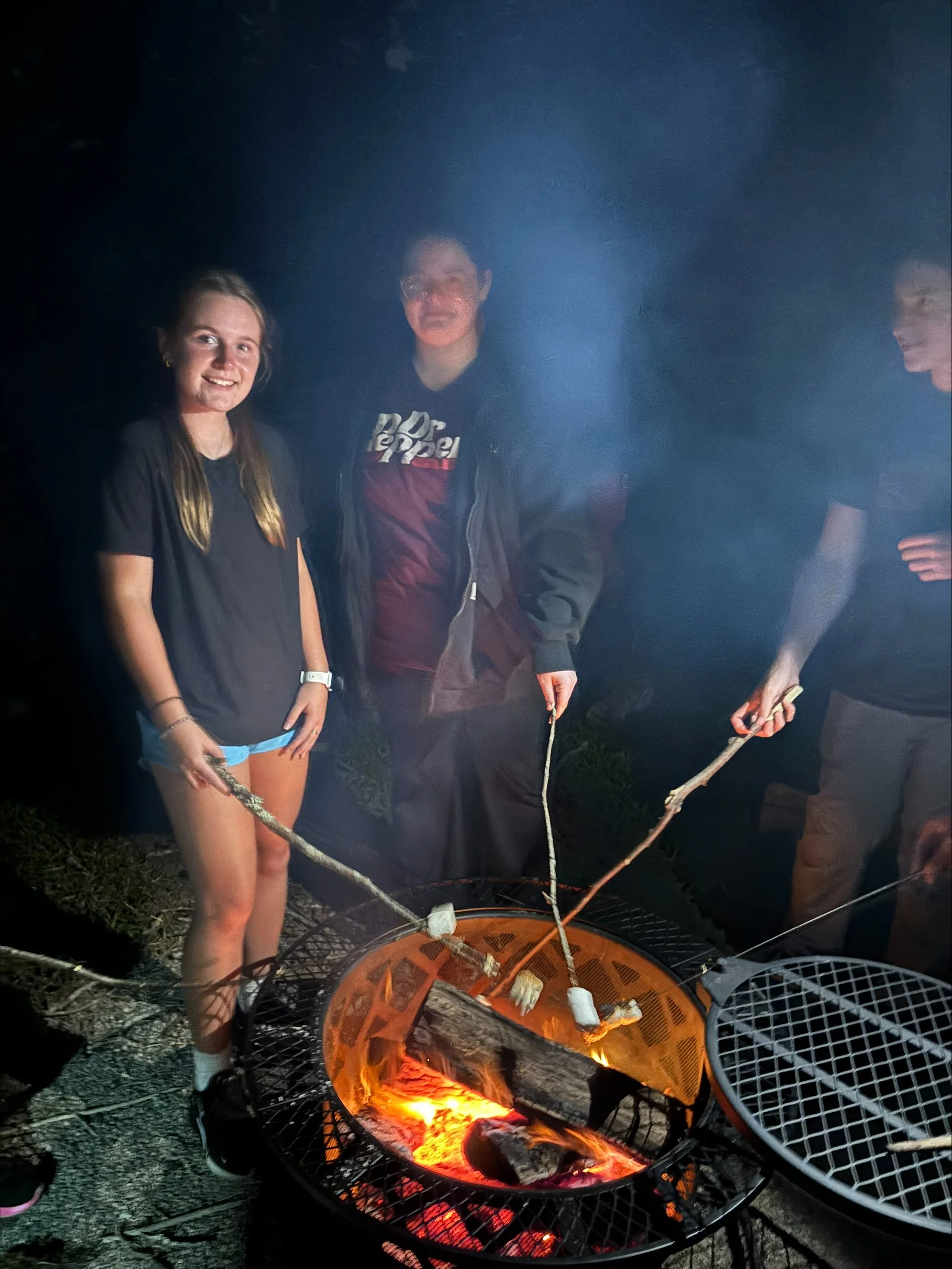What’s New at Wildlands
Welcome, Amy!
Amy Burt (she/her) joined the Wildlands staff late last month. Read on to get to know our new Programming Coordinator! And be sure to say hello when you see Amy on the trails this fall.
Amy studied adventure therapy in college, a testament to her belief in nature's power to heal, restore, and connect people of all ages and backgrounds. As Wildlands Trust’s Programming Coordinator, she is excited to find creative ways to engage new audiences in outdoor learning, recreation, and conservation.
Amy spent her childhood haying fields and enjoying the cows on her family’s land and exploring local wildlands with her mom, a volunteer hike leader at the Blue Hills Reservation. Through these experiences and a brief 4-H season earning blue ribbons with her show cow Nancy, she learned to appreciate the diverse benefits of local open space.
Despite growing up "painfully introverted,” Amy knew early on that she wanted to help people, especially kids. By fourth grade, she was already a classroom helper for her first-grade teacher. At Bristol-Plymouth Regional Technical School, volunteer work and dental assistant training bolstered her vision for a career of service to others.
Amy set her sights on social work, but a presentation from Unity College (now Unity Environmental University) in New Gloucester, Maine, opened her eyes to an alternative path that melded her passions for people and nature. She earned her Bachelor of Science in adventure therapy and adventure-based environmental education, with a minor in environmental interpretation and education. After graduation, Amy joined the Girl Scouts of Southeastern New England as the Program Manager of Outdoor Experience and STEM, leading youth programming with local and regional partners.
At Wildlands, Amy is excited to reconnect with her undergraduate field of study through hands-on environmental programming for learners of all ages. She is eager to serve her home state, expanding Wildlands’ educational reach across Southeastern Massachusetts. “If people leave our programs feeling more comfortable to explore nature on their own, or inspired to bring a friend next time, I'll have done my job,” Amy reflected.
In her free time, Amy enjoys playing the acoustic guitar, singing karaoke (go-to song: “Love Shack” by the B-52's), and playing with her pet guinea pig, Caterpillar (Catter for short). During college, Amy held several roles in youth education, including at Wind-in-the-Pines Girl Scout camp in Plymouth, elementary schools in Maine and Somerset, MA, and 4-H camps with the University of Maine Cooperative Extension—where, after a last-minute staffing change, she helped guide two campers up Mount Katahdin!
Wildlands Awarded Grant to Advance Tree Planting in Taunton, Brockton
By Thomas Patti, Communications Coordinator
On July 26, the Commonwealth of Massachusetts awarded Wildlands Trust $52,300 through the Greening the Gateway Cities Program (GGCP) to advance urban tree planting in Taunton and Brockton, two of the largest Environmental Justice communities in Southeastern Massachusetts.
The award marks the sixth time Wildlands has received funds through GGCP, but the first time for work in Taunton. From 2017 to 2021, Wildlands conducted outreach in Brockton through the program.
“GGCP is a win-win-win for urban landowners and communities, especially in the face of climate change,” said Wildlands Chief of Staff Rachel Bruce. “As the program outreach partner in Taunton and Brockton, we're thrilled for the continued opportunity to improve quality of life in some of the most densely populated areas of Southeastern Massachusetts."
Community tree planting as part of the GGCP in Brockton.
GGCP is “an environmental and energy efficiency program designed to reduce household heating and cooling energy use by increasing tree canopy cover in urban residential areas in the state’s Gateway Cities,” according to the Massachusetts Department of Conservation & Recreation (DCR).
Through the program, state and local foresters plant trees in high-priority neighborhoods, defined by socioeconomic status, existing tree cover, housing stock age, population size, and other variables. Beyond energy savings, GGCP aims to unlock other key benefits of urban tree planting, such as local employment, improved water and air quality, and a greater sense of community. GGCP is a partnership between DCR, the Executive Office of Energy and Environmental Affairs (EEA), and Gateway Cities and local grassroots organizations.
Wildlands’ award comes via GGCP’s Non-Profit Partnership Grant Program, which funds non-profits to conduct outreach to residents and business owners interested in receiving free trees from the program. Our outreach efforts will include in-person community engagement, recruiting and training tree maintenance volunteers, and distributing print and digital materials to educate the public about GGCP and the diverse benefits of urban tree planting.
Brockton is a Tree City USA thanks in part to GGCP tree-planting efforts.
“Expanding our forest canopy is one piece of the larger puzzle to combatting climate change in Massachusetts,” said EEA Secretary Rebecca Tepper in a press release. “With continuous heat waves leading to higher energy bills and greater greenhouse gas emissions, our Greening the Gateway Cities Program leverages our state resources and engages residents to help plant trees and enhance public health. Reducing the urban heat island effect is a top priority, and our non-profit partnerships through the GGCP will help cool our neighborhoods, towns, and cities.”
In 2023, with funding from NOAA, Wildlands and Manomet Conservation Sciences worked with the City of Brockton and Towns of Avon and Abington to test the urban heat island effect in the Brockton area, finding that temperatures differed between tree-shaded and exposed paved areas by up to 13° on a single July afternoon. Planting trees in highly developed areas is key to leveling the playing field in Environmental Justice communities that already suffer disproportionately from climate change. Besides reducing energy costs and protecting public health from intensifying heat waves, denser tree canopies reduce flooding and improve water quality by absorbing and filtering stormwater runoff.
GGCP crew delivering free trees to the Brockton community.
Wildlands thanks the Commonwealth of Massachusetts for its continued confidence in and support of our efforts to advance environmental justice throughout our service region.
We will begin outreach this fall in Taunton and this winter in Brockton. Stay tuned for updates as our work continues!
Brockton Summer Youth Programs Make National Headlines, Local Impact
By Thomas Patti, Communications Coordinator
Across a decade-plus of land protection projects, environmental education campaigns, tree planting initiatives, and park restoration efforts, the Brockton community has matched Wildlands Trust’s enthusiasm for local conservation every step of the way. This summer has been no different, leading to a banner season for our youth conservation programming in and around this city of over 100,000 people.
2024 marks the 10th year that Wildlands has engaged Brockton-area youth in environmental education. Since 2015, Wildlands, along with Manomet Conservation Sciences, has coached and sponsored the Brockton High School Envirothon Team. In summer 2022, we moved Green Team, a paid service-learning program for high school students and recent graduates, from Plymouth to Brockton. Recognizing the ever-growing appetite for youth conservation opportunities in Brockton, we introduced a second summer program in 2024: Climate Crew.
This summer, the 12 members of Green Team worked exclusively in D.W. Field Park, carrying out necessary improvements as part of our D.W. Field Park Initiative. Tasks included waste management, gardening, water quality testing, and providing valued input on the D.W. Field Park Master Plan.
Photo gallery: Green Team completed various improvement projects at D.W. Field Park in Brockton this summer. Photos by Clare Cunningham/Manomet Conservation Sciences.
Climate Crew has blossomed in its inaugural summer. Part of the Brockton Kids Lead the Way Initiative and generously funded by the LSP Association, Climate Crew equips eight young conservationists with technical skills and professional knowledge as they construct an outdoor classroom at Hancock Elementary School in Brockton. The classroom will include a learning space with picnic tables and a whiteboard, two nature trail loops featuring a boardwalk and interpretive signage, and a climate resiliency garden. According to Stewardship Programs Manager Zoë Smiarowski, Climate Crew has succeeded on multiple levels.
“It has been incredible to see Climate Crew engage with the classroom space in the way they have,” Zoë said. “It’s so special to watch these young leaders develop stewardship skills and apply them to a project that will benefit their community for years to come. We’ve completed so much work with their help, with plenty of laughs along the way.”
Photo gallery: Climate Crew is working to build an outdoor classroom at Hancock Elementary School in Brockton. Photos by Clare Cunningham/Manomet Conservation Sciences and Rachel Bruce/Wildlands Trust.
Climate Crew has even garnered national attention: on August 4, Ivy Scott of the Boston Globe published a compelling piece about Massachusetts teens and young adults taking local initiative to combat climate change and feelings of powerlessness. Climate Crew served as the centerpiece example.
We particularly love this quote from Climate Crew member Xaven Studer: “When you think about climate issues, it feels like a giant thing that most people don’t touch, even if they care about it, because it’s too overwhelming. But it matters, even the little things ... and seeing it unfurl, I’m excited I’m contributing to something important."
You can read the article here.
Members of both Green Team and Climate Crew work to restore lost connections between their urban communities and the wild places around them. But many of them have never experienced a night under the stars, insulated from the sounds of the city by vast, untouched forests. In late July, for the first time since Green Team moved to Brockton, we hosted the members of both of our summer programs in an overnight camping retreat at the Stewardship Training Center in Plymouth. Green Team and Climate Crew members explored the pine barren forests of Halfway Pond Conservation Area, enjoyed s’mores around a campfire, and made lasting memories and friendships with like-minded peers.
Photo gallery: Last month, members of Green Team and Climate Crew gathered at the Stewardship Training Center in Plymouth for an overnight camping retreat. Photos by Clare Cunningham/Manomet Conservation Sciences.
“As the sun set and the stars came out, most of our crewmembers remarked on how they couldn’t remember the last time they’d seen stars and a completely dark sky,” said Programming Coordinator Max Phelps. “In that moment, I understood how truly special and important this campout was for our kids.”
Green Team concluded on August 8, while Climate Crew will meet for its final session next week. Stay tuned as work on the Hancock School outdoor classroom continues!
We thank all the young adults who embraced these projects with passion and purpose. We are confident that the future of our region’s natural resources is in more than capable hands.
Learn more about all our Brockton youth programs at wildlandstrust.org/youth-programs.
Wildlands Bids Farewell to Erik Boyer, Max Phelps
By Thomas Patti, Communications Coordinator
As in any ecosystem, change is constant at Wildlands. But this summer, two staff departures will leave big hiking boots to fill in our regional conservation community.
Erik Boyer departs Wildlands this week after nearly 10 years spearheading our stewardship operations. As Director of Stewardship, Erik has worked to advance the biological health of our conservation lands, building relationships with countless partners and volunteers along the way. Erik will now return to the Town of Dennis, where he worked as a conservation intern and natural resource officer before joining Wildlands. This time, he will add the title of Conservation Agent.
“Erik Boyer has meant a lot to Wildlands Trust over the past decade, so it is not a small thing that he has decided to take a new position with the Town of Dennis,” said Wildlands President Karen Grey. “Erik built the stewardship program. He became the first full-time, year-round stewardship employee in 2015. Over the years, he led the upgrade of our fee properties, a system for ensuring monitoring and enforcement on our Conservation Restriction lands, and the upstart of the Community Stewardship Program and the Adopt-A-Preserve program. He accomplished a tremendous amount of work for us, and we are forever grateful. In addition to being a great employee, Erik is a wonderful colleague, always leading with kindness and a willingness to help. He is respected by our partners and volunteers his time to help our field, serving on the Plymouth Trails Committee, Historic O’Neil Farm Board of Directors, and the Massachusetts Recreational Trail Advisory Board.”
Photo gallery: earlier this month, Wildlands staff, partners, and volunteers celebrated Erik’s decade of service over pizza and drinks at IndieFerm Brewing in Plymouth.
The universal respect Erik has earned throughout the regional conservation community was on full display earlier this month, when Wildlands staff, partners, and volunteers celebrated Erik over pizza and drinks at IndieFerm Brewing in Plymouth. On behalf of Wildlands, President Karen Grey gifted Erik an Osprey carry-on pack. Erik also received a photo of Tucker Preserve, framed and signed by Wildlands staff and friends, and a signed photo of our three Key Volunteers, Marilynn Atterbury, Skip Stuck, and Rob MacDonald.
“I’ve deeply valued serving Southeastern Massachusetts over the last decade,” Erik said. “The most meaningful aspect of my work has been fostering relationships with volunteers, municipalities, and other partners who share the mission of protecting our natural resources and building community around them. I’d like to thank the greater Wildlands community for their generous collaboration on this important work.”
Max Phelps demonstrates D.W. Field Park waste pick-up data entry to Green Team in summer 2023.
Wildlands is also bidding farewell to Max Phelps, who is moving to Philadelphia in September after serving as our Programming Coordinator since June 2023. In their time with Wildlands, Max coordinated Wildlands staff and volunteers to spread awareness and appreciation of conservation lands across Southeastern Massachusetts through guided hikes, meditations, lectures, and more. They also orchestrated our 50th Anniversary Celebration and Spring Open House, two major events with many moving parts. Finally, they served as the face of Wildlands’ youth programming in Brockton, leading the Brockton High School Envirothon team during the school year and Green Team and Climate Crew over the summers.
“Max jumped into a busy 50th anniversary year when they started at Wildlands,” said Wildlands Chief of Staff Rachel Bruce. “Their positive attitude and friendly demeanor helped them tackle big projects and build our adult and youth programming community over the past year. They’ve done a fantastic job, and we can’t wait to see what they do next!”
Max leads a group of Brockton youth on a hike at Halfway Pond Conservation Area in Plymouth.
“I am so thankful for my time at Wildlands, where I’ve been able to grow and learn so much thanks to my amazing coworkers and our wonderful volunteers,” Max said. “I’m most proud of my work with youth in Brockton, coaching the Envirothon team at Brockton High School and leading our summer service-learning programs, Green Team and Climate Crew. I’m excited to keep tabs on all the great work Wildlands will continue to do in Brockton and across Southeastern Massachusetts.”
Wildlands thanks Erik and Max for their dedication and enthusiasm for our work. Please be sure to say thank you and farewell when you see them on the trails and in the community!
Wildlands’ Tips for Summer Trail Safety
Sylvester Field Conservation Area in Hanover. Photo by Jerry Monkman.
By Thomas Patti, Communications Coordinator
Summer is a beautiful time to explore Southeastern Massachusetts. It’s little wonder that birds and humans alike migrate thousands of miles each year to settle in our region during the warmest months. Flowers and their pollinators burst with color. Sunlight streams through shady forest canopies and over rolling, grassy fields. Cool water runs through coastal rivers, ponds, and streams, offering vital refuge to fish, reptiles, and people.
But summer also presents health and safety risks to visitors to our region’s trails. Read on to learn how simple precautions can keep you and your loved ones hiking, paddling, and enjoying nature all summer long.
Beat the Heat
Tucker Preserve in Pembroke. Photo by Jerry Monkman.
Climate change has made summer heat waves longer, hotter, and more frequent—and models predict these trends will continue through much of the century. Hiking in high heat requires extra planning and attention to your body.
Pack water and drink it often. Water can feel cumbersome to bring along on a hike, but any inconvenience pales in comparison to an on-trail health emergency. Even short hikes can become dangerous without early-and-often water breaks. How much water should you expect to drink? Consult Camelbak’s Hydration Calculator to find out. Also make sure to stay hydrated in the days leading up to your excursion; otherwise, dehydration can set in sooner and more severely on the trail.
Prevent overhydration by keeping salt levels balanced with electrolyte-packed sports drinks, salty snacks, or salt tablets.
Monitor for symptoms of heat illness. Fatigue, weakness, nausea, dizziness, and muscle cramps can all signal heat exhaustion. Ignoring these signs can lead to heat stroke, which in turn can lead to loss of consciousness and even death. If something doesn’t feel right, turn around. The trail will be there next week.
Know your limits. Think twice about hitting the trails amid extreme heat. Check the forecast before you head out, as temperature and precipitation can change rapidly during the summer. Avoid hiking during the hottest part of the day, often in the afternoon. If you’re on the fence about heading out, err on the side of caution and plan for another day.
Cortelli Preserve in Plymouth. Photo by Jerry Monkman.
Slay the Rays
Protect your eyes and skin from sun damage by wearing UPF clothing, a wide-brimmed hat, and sunglasses. Apply sunscreen of SPF 30 or higher before and during your hike. These precautions can save you from temporary afflictions like painful sunburns and eye irritation and chronic, severe, and even life-threatening conditions like vision loss and skin cancer.
Ditch the Ticks
Unusually warm winters in recent years have caused local tick populations to surge earlier in the season, with consequent increases in Lyme Disease and other tick-borne illnesses. Check yourself for ticks daily, as well as during and after outdoor excursions. Check your dogs, too, as ticks lodged in their fur can make them sick and take up residence inside your home. Remove any ticks on you or your loved ones with tweezers. Talk to your doctor if you develop a rash at the site of the bite.
Minimize your chances of encountering ticks by staying on the center of the trail, away from overgrown vegetation, and by wearing long-sleeved clothing, with your pants tucked into your socks. Wearing light-colored clothes can make it easier to detect ticks. To repel ticks, apply DEET to exposed skin and permethrin to clothing.
Leaves of Three, Let It Be
Poison ivy. Photo by Jerry Monkman.
Poison ivy proliferates in the summer months, so keep an eye out for its glossy three leaves along trail edges and on vines up tree trunks. If you are visiting a trail with a known abundance of poison ivy, wear a long-sleeved shirt and pants to protect yourself from painful rashes.
Share the Trail
When trail visitation peaks during summer months, conflicts can arise among different user groups. Hikers should stay on the lookout for bikes, which can move at high rates of speed around tight corners with limited visibility.
This is true for both mountain biking, an authorized use of many Wildlands trails, and dirt biking, which is prohibited on all Wildlands property. Dirt bikes create safety hazards and disturb sensitive ecosystems by causing erosion on trails. Enforcement is challenging, however, as some dirt bikers may ignore posted signage and physical barriers. So, hikers should maintain a watchful eye and listening ear. Even when you have the right of way, get out of the way of dirt bikers to avoid collisions and serious injury. Learn more about off-highway vehicle regulations and report violations here.
Willow Brook Farm in Pembroke. Photo by Jerry Monkman.
Ready to get out there? Explore our trails across Southeastern Massachusetts at wildlandstrust.org/trails. Stay safe and have fun!
Source: “7 Essential Tips to Hike Safely This Summer.”AAA. April 2024.






















































